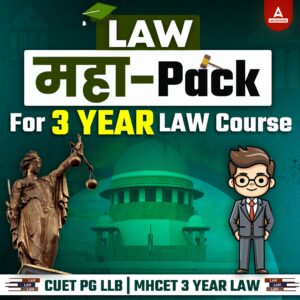CLAT English Language Most Expected Questions: Looking to boost your Common Law Admission Test (CLAT) 2026 preparation? The English Language section is one of the most scoring parts of the exam, but only if you practice the right kind of questions. This section tests your reading comprehension, vocabulary, and grammar skills, which are essential for cracking CLAT with a good rank. Since the exam is scheduled to be held on December 7, 2025 in offline mode (pen-and-paper based) from 2:00 PM to 4:00 PM, it’s the perfect time to focus on high-weightage topics. To make things easier, we’ve brought you the most expected CLAT English Language questions that mirror the real exam pattern. Practice them well to enhance speed, accuracy, and confidence.
CLAT English Language Exam
The English Language portion of the Common Law Admission Test (CLAT) conducted by the National Law Universities (NLUs), assesses a student’s reading, understanding, and grammar proficiency. It is an important component because it tests a student’s ability to read passages, understand them, analyze the passages and answer questions based on those passages. The CLAT exam is conducted for students who wish to take admission in the top National Law Universities (NLUs) of India after 12th. Any student studying in or who has passed class 12 can apply for CLAT.
The English portion generally contains comprehension passages with questions, and topics including vocabulary, synonyms, antonyms and the usage of grammar/ language. Taking time to prepare for this portion of the exam definitely helps in improving your score, but also in developing solid communication skills for the future.
CLAT English Language Most Expected Questions
The CLAT English Language section occupies an important position in the exam as it tests a candidate’s ability to read, comprehend, and reason. It is important to note that this section is not just about grammar, but more about how comprehensively you read a passage and respond with some intelligence. Most expected questions will generally come from unseen passages, including questions on main idea, tone, or vocabulary (synonyms/antonyms) or questions based on inference. There can be some para jumbles or fill-in-the-blanks, too. Practicing these questions regularly will definitely improve your accuracy and speed. Since this section is extremely scoring, it is possible to enhance your overall CLAT performance significantly.
Expected Questions for CLAT English Exam
Passage 1
The call of self-expression turned the village of the internet into a city, which expanded at time-lapse speed, social connections bristling like neurons in every direction. At twelve, I was writing five hundred words a day on a public LiveJournal. By twenty-five, my job was to write things that would attract, ideally, a hundred thousand strangers per post. Now I’m thirty, and most of my life is inextricable from the internet, and its mazes of incessant forced connection—this feverish, electric, unliveable hell.
The curdling of the social internet happened slowly and then all at once. The tipping point, I’d guess, was around 2012. People were losing excitement about the internet, starting to articulate a set of new truisms. Facebook had become tedious, trivial, exhausting. Instagram seemed better, but would soon reveal its underlying function as a three-ring circus of happiness and popularity and success. Twitter, for all its discursive promise, was where everyone tweeted complaints at airlines and moaned about articles that had been commissioned to make people moan. The dream of a better, truer self on the internet was slipping away. Where we had once been free to be ourselves online, we were now chained to ourselves online, and this made us self-conscious. Platforms that promised connection began inducing mass alienation. The freedom promised by the internet started to seem like something whose greatest potential lay in the realm of misuse.
Even as we became increasingly sad and ugly on the internet, the mirage of the better online self continued to glimmer. As a medium, the internet is defined by a built-in performance incentive. In real life, you can walk around living life and be visible to other people. But on the internet—for anyone to see you, you have to act. You have to communicate in order to maintain an internet presence. And, because the internet’s central platforms are built around personal profiles, it can seem—first at a mechanical level, and later on as an encoded instinct—like the main purpose of this communication is to make yourself look good.
Online reward mechanisms beg to substitute for offline ones, and then overtake them. This is why everyone tries to look so hot and well-travelled on Instagram; why everyone seems so smug and triumphant on Facebook; and why, on Twitter, making a righteous political statement has come to seem, for many people, like a political good in itself. The everyday madness perpetuated by the internet is the madness of this architecture, which positions personal identity as the centre of the universe. It’s as if we’ve been placed on a lookout that oversees the entire world and given a pair of binoculars that makes everything look like our own reflection.
Q1. Which of the following statements can be inferred from the above passage?
- The internet expanded very slowly
- The internet can be used to cause harm
- The internet is addictive
- The main purpose of social media platforms is to dissuade people from showing off
Q2. All the following statements are ‘truisms’, except:
- The internet has changed the way the world works.
- A preference for cat videos can reveal a lot about your personality.
- Like with any tool, digital technology has both advantages and disadvantages.
- Only time can tell what the future holds.
Q3. Which of the following comes closest to the underlined sentence in the passage?
- The way we use the internet says a lot about who we are.
- The internet has reduced the distance between people living across the world.
- The internet has the ability to customise what we access based on our identity.
- The internet only shows us what we don’t want to see.
Q4. Which of the following is a metaphor?
- the village of the internet
- this feverish, electric, unliveable hell
- three-ring circus of happiness and popularity and success
- all the above
Q5. Which of the following categories best describes this piece of writing?
- Non-fiction essay
- Fiction
- Academic paper
- Poem
Passage 2
I grew up in a small town not far from Kalimpong. In pre-liberalization India, everything arrived late: not just material things but also ideas. Magazines — old copies of Reader’s Digest and National Geographic — arrived late too, after the news had become stale by months or, often, years. This temporal gap turned journalism into literature, news into legend, and historical events into something akin to plotless stories. But like those who knew no other life, we accepted this as the norm. The dearth of reading material in towns and villages in socialist India is hard to imagine, and it produced two categories of people: those who stopped reading after school or college, and those — including children — who read anything they could find.
I read road signs with the enthusiasm that attaches to reading thrillers. When the iterant kabadiwala, collector of papers, magazines, and rejected things, visited our neighbourhood, I rushed to the house where he was doing business. He bought things at unimaginably low prices from those who’d stopped having any use for them, and I rummaged through his sacks of old magazines. Sometimes, on days when business was good, he allowed me a couple of copies of Sportsworld magazine for free. I’d run home and, ignoring my mother’s scolding, plunge right in — consuming news about India’s victory in the Benson and Hedges Cup….
Two takeaways from these experiences have marked my understanding of the provincial reader’s life: the sense of belatedness, of everything coming late, and the desire for pleasure in language. …. Speaking of belatedness, the awareness of having been born at the wrong time in history, of inventing things that had already been discovered elsewhere, far away, without our knowledge or cooperation, is a moment of epiphany and deep sadness. I remember a professor’s choked voice, narrating to me how all the arguments he’d made in his doctoral dissertation, written over many, many years of hard work (for there indeed was a time when PhDs were written over decades), had suddenly come to naught after he’d discovered the work of C.W.E. Bigsby.
This, I realised as I grew older, was one of the characteristics of provincial life: that they (usually males) were saying trite things with the confidence of someone declaring them for the first time. I, therefore, grew up surrounded by would-be Newtons who claimed to have discovered gravity (again). There’s a deep sense of tragedy attending this sort of thing — the sad embarrassment of always arriving after the party is over. And there’s a harsh word for that sense of belatedness: “dated.” What rescues it is the unpredictability of these anachronistic “discoveries” — the randomness and haphazardness involved in mapping connections among thoughts and ideas, in a way that hasn’t yet been professionalised.
Q6. What use was the kabadiwala (wastepicker) to the author?
- The kabadiwala bought up all her magazines.
- The kabadiwala’s stock of books and magazines were of interest to the author.
- The kabadiwala was about to steal the author’s magazines.
- The author ordered books online which the kabadiwala delivered.
Q7. What according to the author is essential about the experience of being a ‘provincial reader’?
- Belatedness in the sense of coming late for everything.
- Over-eagerness.
- Accepting a temporal gap between what was current in the wider world and the time at which these arrived in the provincial location.
- None of the above
Q8. Why did the author feel a sense of epiphany and deep sadness?
- Because the things that felt special and unique to the author, were already established and accepted thought in the wider world.
- Because the author was less well-read than others.
- Because the author missed being in a big city.
- All the above
Q9. What does the word ‘anachronistic’ as used in the passage, mean?
- Rooted in a non-urban setting
- Related to a mofussil area
- Connected with another time
- Opposed to prevailing sensibilities
Q10. Which of the following options captures the meaning of the last sentence best?
- Though the author feels provincial, she pretends to be from the metropolis.
- Though the author feels dated in her access to intellectual ideas, her lack of metropolitan sophistication lets her engage with the ideas with some originality.
- Though the author is aware of the limitedness of her knowledge, she is confident and can hold her own in a crowd. She also proud of her roots in the small town.
- All the above
Passage 3
Crypto currencies are a terrible thing. They are the essence of a Ponzi scheme whose value is based entirely on a greater fool prepared to buy it. The promise of alchemy-turning lead into gold has bewitched humanity throughout the ages and crypto currencies are just the latest alchemy. Do not get me wrong, if rich people want to lose their money, in this or any other way, they should be allowed to do so. The rich should be the vanguards of new things in case something unforeseen and good falls out of them. But we need to protect those vulnerable consumers whose lives are such that almost any get-rich-quick schemes will be seductive, and seven out of 10 times, they will lose their life savings. Crypto currencies are today’s South Sea Bubble – one of the earliest recorded financial bubbles that took place in the 1720s’ Britain. Meme-based currencies like Dogecoin, Dogelon Mars and Doge Dash remind me of the infamous plan of one company during the South Sea Bubble to raise money “for carrying on an undertaking of great advantage; but nobody to know what it is.”
The crypto currency bubble is worse than tulip mania. Through the veil of technology, crypto currency enthusiasts are leaning on policy-makers to permit them to be exempt from regulation, privatize money, and make money so disconnected from the economy that it would reap financial disaster. There are many reasons to avoid financial disasters, but one of them is that they ratchet up poverty and inequality. The current money-credit system is not perfect, but like democracy, it is the worst system barring all the others. It has evolved from the ashes of the system crypto currency enthusiasts are trying to resurrect.
The current system is vulnerable to attack because money is little understood. Crypto currency enthusiasts have attracted a following based on the fiction that the central bank or government creates money and are busy debasing it in their self-interest. This is not the case, but then again, there is some overlap between crypto currency advocates, conspiracy theorists, and anti-vaxxers. The time has come for someone to stand up for the current fiat money system and explain that while it could be better still, it has been associated with far more growth, much more distributed, and has responded better to economic crisis than what came before.
In today’s money-credit system, banks create money when they issue a loan and place the loan’s proceeds into the account of their customers, creating a deposit. Money is, in fact, a tradable debt. The bank’s deposit can be used as cash because the bank is a regulated issuer of loans and deposit-taker, which gives the deposit credibility and convertibility. The central bank only influences the creation of money indirectly by its regulatory requirement that a proportion of the loans need to be funded by shareholder’s profits. They need to have skin in the game. Money creation then is based on thousands of separate decisions by loan officers and is more distributed than a centralized algorithm like Bitcoin. And its supply is determined by the private demand for loans, which means it is closely aligned to the economy.
Q11. Which of the following does best describe attitude of the author towards rich people?
- Concerned
- Assiduous
- Indifferent
- Sympathetic
Q12. Which of the following is true in the context of the passage?
- The author defends the current money-credit system.
- The author rejects the idea that the central bank or government creates money and are busy debasing it in their self-interest.\
- The author backs the protection of poor from menace of crypto currencies.
- All the above
Q13. Which rhetorical device is employed in ‘crypto currencies are just the latest alchemy’?
- Antithesis
- Metaphor
- Personification
- Synecdoche
Q14. Which of the following does best describe the passage?
- Argumentative and explanatory
- Descriptive and argumentative
- Narrative and explanatory
- Expository and argumentative
Q15. What do the crypto currency enthusiasts rely on?
- Exemption from regulation
- Privatization of money
- Disconnection of money from the economy
- All the above
Passage 4
As a six-year-old child-beggar, Saroo slept off in a stationary train in Khandwa, Madhya Pradesh; however, when he woke up, he found himself in an empty compartment of a train thundering towards Kolkata where he spent a couple of weeks in a state of panic and hopelessness. Finally, he ended up in a local government adoption centre from where he was adopted by an Australian couple. Twenty five years later, Saroo felt the urge to trace his biological mother and see in what state she lived. Relentlessly, he used Google’s satellite feature to map the parts of the country that could have possibly been his own hometown. The search was a long and arduous one; nevertheless, the perseverance did pay. One eventful day, he met his mother; thereafter, he continued to keep in touch with her.
If technology can unite people with their loved ones, it can also make them distant. The unlimited variety of applications (apps) available to toddlers, teenagers and adults might have revolutionized their lives for the better, but these very apps have snatched away the joys of long naturewalks; they have encroached upon the time and space that people earlier used for physical interaction; they have drilled deep chasms of loneliness in the lives of countless numbers of people.
Simple pleasures of life include visiting friends and relatives, playing matches in open spaces, interacting with people in markets, public libraries and clubs. However, with the escalating rage of using apps like those for social media, playing virtual games, and homedelivery services, these joyous moments are fading into oblivion, and the pall of loneliness is getting heavier by the day.
Where are we heading to? Are we going to allow ourselves to be swamped by apps? Are we going to allow socialmedia to engulf us in a deluge of loneliness and isolation? Are we going to drive ourselves to situations that will ultimately demand mental and physical therapies to regain normalcy? Do we not know that physical interaction is as essential for mental health as food and water is for physical health?
Earlier, social isolation was mostly experienced by some of the elderly people who were devoid of an occupation, and bereft of company of their loved ones. Unfortunately today, an unhealthy solitude prevails among numerous children, teenagers and adults too; subsequently, there is an alarming increase in the demand for mental health therapy practitioners.
The necessity of engaging psychologists in schools and colleges is evidently on the rise. The psychologists are required to identify and address the learning and behavioral needs of students who approach them for guidance; moreover, if required, the professionals are expected to help them in strengthening their emotional, social and academic skills.
Regardless how alarming the situation might be, it is never too late. If people revert to the earlier trend of shopping off-line, going for naturewalks, playing outdoors games, and catching up with friends in their homes or cafes more frequently, they can keep their heads firmly well above the ocean of loneliness.
Q16. From the passage it is evident that Saroo’s desire to find his mother
- Ended up being a distant dream.
- Inspired him to use Google’s satellite feature intermittently.
- Waned as time went by.
- Did not slacken till he succeeded.
Q17. In the sentence ‘these very apps have snatched away the joys of long nature-walks;’ the author has
- Satirized nature
- Metaphorized apps
- Personified apps
- None of the above
Q18. From the passage one can conclude that
- It is impossible for people to reduce the usage of apps.
- There is a direct correlation between loneliness and excessive usage of social- media apps.
- The usage of technology is as essential for mental-health as food and water is for physical health.
- All senior citizens are lonely because they are not tech-savvy.
Q19. From the passage it can be inferred that presently in many educational institutions
- The number of teachers who pass the buck to psychologists is on the rise.
- Special emphasis is being laid on the mental and emotional health of the students.
- The usage of educational apps is being discouraged significantly.
- All the students feel the need to be counseled by psychologists.
Q20. In the concluding paragraph of the given passage, the writer’s tone can be best described as
- Optimistic
- Despairing
- Laudatory
- Apologetic
Passage 5
Public speaking is a powerful real-life skill. Over the centuries, impressive speeches made by people from various walks of life have helped to change hearts, minds and shape the world as we see it today. Speeches that are delivered with intense emotions and conviction can infuse compassion and forgiveness; elevate levels of hatred and destruction; break or unite nations.
On October 5, in 1877 in the mountains of Montana Territory, when Chief Joseph surrendered to General Nelson A. Miles, the former gave a Surrender Speech. The speech included these words: “It is cold, and we have no blankets; the little children are freezing to death. I want time to look for my children, and see how many of them I can find. Maybe I shall find them among the dead. Hear me, my Chiefs! I am tired; my heart is sick and sad. From where the sun now stands I will fight no more forever.”
The heart-wrenching speech bared the grief and misery of the speaker, and those subjected to overwhelming hardships.
During World War II, the speech We Shall Fight on the Beaches delivered by Winston Churchill on June 4, 1940 is considered a high-powered speech that strengthened the determination of those present in the House of Commons. In the speech, he said, “Even though large tracts of Europe and many old and famous States have fallen or may fall into the grip of the Gestapo and all the odious apparatus of Nazi rule, we shall not flag or fail. We shall go on to the end, we shall fight in France, we shall fight on the seas and oceans, we shall fight with growing confidence and growing strength in the air, we shall defend our island, whatever the cost may be, we shall fight on the beaches, we shall fight on the landing grounds, we shall fight in the fields and in the streets, we shall fight in the hills;”
In 1950, William Faulkner was honoured with a Nobel Prize for his significant contributions to the American novel. This was the time when the Soviet Union had found the possible implications of the use of the atomic bomb, and people had begun to live in the fear of annihilation. In his Nobel Prize Acceptance Speech, Faulkner urged writers of various genres to think and write beyond the fear of destruction, and instead write materials that would lift the human spirit. The powerful message included: “I believe that man will not merely endure: he will prevail. He is immortal, not because he alone among creatures has an inexhaustible voice, but because he has a soul, a spirit capable of compassion and sacrifice and endurance. The poet’s, the writer’s, duty is to write about these things. It is his privilege to help man endure by lifting his heart, by reminding him of the courage and honor and hope and pride and compassion and pity and sacrifice which have been the glories of his past. The poet’s voice need not merely be the record of man, it can be one of the props, the pillars to help him endure and prevail.”
Undoubtedly, effective speeches have a long-lasting impact on the minds of the listeners, and they elevate the levels of awareness or actions the speaker intends to raise or catalyze.
Q21. The main idea of the passage is that
- All leaders should be accomplished public speakers.
- An impactful speech can convey a strong message to the listeners.
- A speech should sound pleasing to the ears of the listeners.
- Public speakers should be bold and argumentative.
Q22. The tone of the Surrender Speech is
- Satiric
- Optimistic
- Poignant
- Narcissistic
Q23. It is evident that through his speech, Churchill wished to his countrymen.
- Inform, about the challenges that arise in a war-torn country.
- Warn, against the futility of war.
- Remind, how their endeavours to fight against the Nazi rule had failed miserably.
- Reassure, that they would combat fiercely against their enemy under all circumstances.
Q24. Which one of the following is the least likely to be used to describe Churchill?
- Resolute
- Undaunted
- Complacent
- Unwavering
Q25. In the sentence: ‘The poet’s voice need not merely be the record of man, it can be one of the props, the pillars to help him endure and prevail,’ Faulkner has used to convey the power of a poet’s writings.
- A metaphor
- A simile
- An onomatopoeia
- A transferred epithet
Passage 6
‘So pick a bird,’ Iff commanded. ‘Any bird.’ This was puzzling. ‘The only bird around here is a wooden peacock,’ Haroun pointed out, reasonably enough. Iff gave a snort of disgust. ‘A person may choose what he cannot see,’ he said, as if explaining something very obvious to a very foolish individual. ‘A person may mention a bird’s name even if the creature is not present and correct: crow, quail, hummingbird, bulbul, mynah, parrot, kite. A person may even select a flying creature of his own invention, for example winged horse, flying turtle, airborne whale, space serpent or aeromouse. To give a thing a name, a label, a handle; to rescue it from anonymity, to pluck it out of the Place of Namelessness, in short to identify it — well, that’s a way of bringing the said thing into being. Or, in this case, the said bird or Imaginary Flying Organism.’
‘That may be true where you come from,’ Haroun argued. ‘But in these parts, stricter rules apply.’ ‘In these parts,’ rejoined blue-bearded Iff, ‘I am having time wasted by someone who will not trust in what he can’t see. How much have you seen, eh? Africa, have you seen it? No? Then is it truly there? And submarines? Huh? Also, hailstones, baseballs, pagodas? Goldmines? Kangaroos, Mount Fujiyama, the North Pole? And the past, did it happen? And the future, will it come? Believe in your own eyes and you’ll get into a lot of trouble, hot water, a mess.’ With that, he plunged his hand into a pocket of his auberginey pajamas, and when he brought it forth again it was bunched into a fist.
‘So take a look, or I should say a gander, at the enclosed.’ He opened his hand, and Haroun’s eyes almost fell out of his head. Tiny birds were walking about on Iff’s palm; and pecking at it, and flapping their miniature wings to hover just above it. And as well as birds there were fabulous winged creatures out of legends: an Assyrian lion with the head of a bearded man and a pair of large hairy wings growing out of its flanks; and winged monkeys, flying saucers, tiny angels, levitating (and apparently air-breathing) fish. ‘What’s your pleasure, select, choose,’ Iff urged. And although it seemed obvious to Haroun that these magical creatures were so small that they couldn’t possibly have carried so much as a bitten-off fingernail, he decided not to argue and pointed at a tiny crested bird that was giving him a sidelong look through one highly intelligent eye.
Q26. If Iff is right, which of the following statements is true?
- You should only trust what you cannot see
- Naming something is the only way to make it unreal
- You should only trust what you can see
- Naming something is one way to make it real
Q27. Which of the following applies to Iff?
- He speaks in contradictions
- He has a habit of speaking in synonyms
- He uses proverbs to express ideas
- He uses metaphors to describe things
Q28. Which of the following most accurately describes what the underlined sentence means in the context of the passage?
- Do not restrict your knowledge only to what you can physically see
- Accept everything you see uncritically
- Trusting your senses is a recipe for success
- Learn not to appreciate viewpoints other than your own
Q29. All the words below are related in meaning, except:
- levitate
- fly
- hover
- gander
Q30. What does ‘fabulous’ mean in the passage?
- very good
- unbelievable
- mythical
- enormous
Mistakes to Avoid While CLAT English Preparation
- Focusing only on grammar – Many students spend all their time memorizing grammar rules, but ignore comprehension and vocabulary.
- Skipping reading passages – Long passages seem boring, so students skip them, but most CLAT questions come from passages.
- Neglecting vocabulary – Not noting down or revising difficult words makes understanding passages harder.
- Relying on old patterns – Some students waste time on old-style grammar or synonym questions, while CLAT now focuses more on passages.
- Not practicing enough – Reading notes is not enough; without solving mocks, speed and accuracy don’t improve.
- Ignoring time management – Reading slowly without timed practice can cause panic during the exam.
Best Preparation Tips for CLAT English Language Exam
- Read news articles, editorials, and blogs for 20–30 minutes daily. This improves vocabulary and comprehension.
- Don’t just memorize words—use them in sentences. Revise 5–10 new words daily using flashcards or apps.
- Solve 5–6 years of previous CLAT papers. It helps understand frequently asked questions and reading comprehension patterns.
- Read 1–2 passages daily and answer questions. Focus on the main idea and tone, as CLAT passages can be tricky.
- Strengthen basics like tenses, prepositions, articles, and subject-verb agreement. Use short notes for quick revision.
- Solve practice questions with a timer. This builds speed and accuracy for the exam.
- Take 1 full mock test every week. Track your scores and mistakes, then work on weak areas.
- Focus on one topic per day—vocabulary, comprehension, or grammar. This improves retention and reduces stress

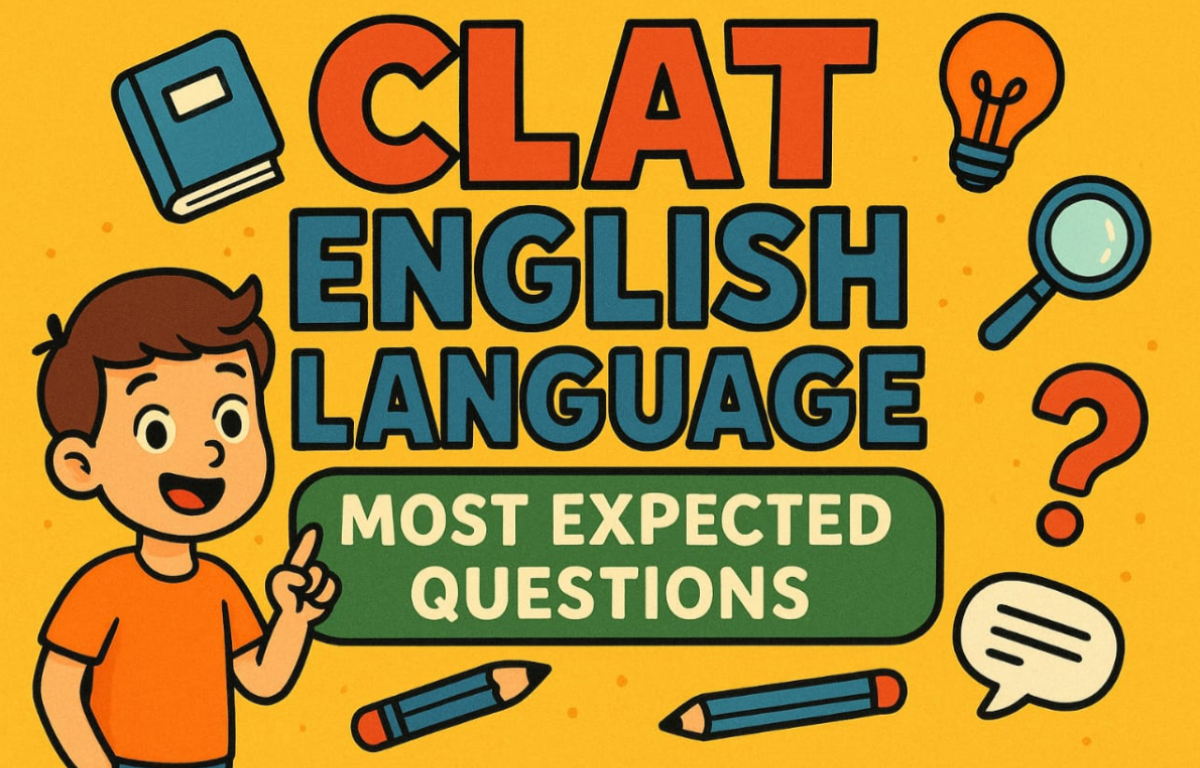
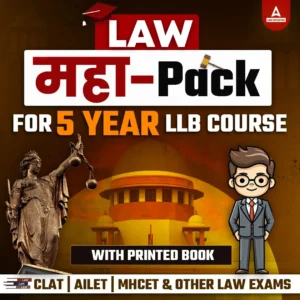
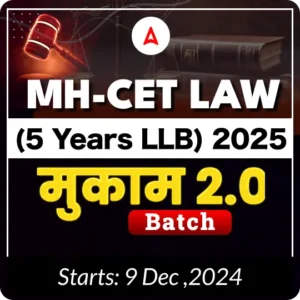







 CLAT Colleges 2026 List: Check Top Unive...
CLAT Colleges 2026 List: Check Top Unive...
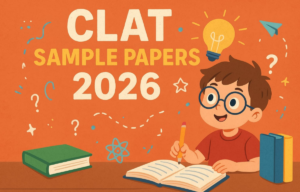 CLAT Sample Papers 2026 Released by Cons...
CLAT Sample Papers 2026 Released by Cons...
 Download CLAT Previous Year Question Pap...
Download CLAT Previous Year Question Pap...

